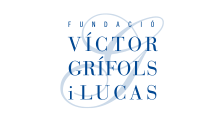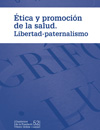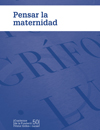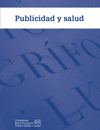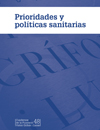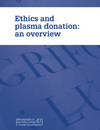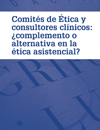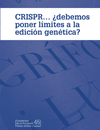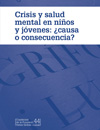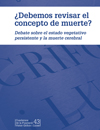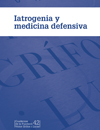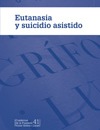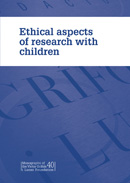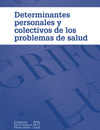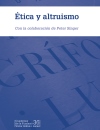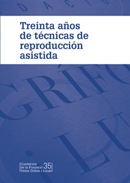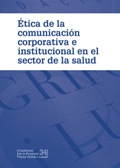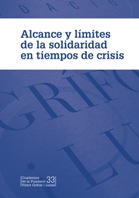52. Ética y promoción de la salud. Libertad-paternalismo. (Ethics and health promotion. Freedom vs. Paternalism)
Health promotion requires an explicit ethical commitment that charts a path between excessive paternalism, on the one hand, and the neglect of those who stand to benefit from community health promotion projects, on the other. This publication, the product of a seminar held jointly with SESPAS, addresses the ethical debate about how to combine these opposing values (freedom and paternalism) from a variety of perspectives.
Only available in Spanish.
51. Una mirada ética en la gestión de conflictos (An ethical perspective on conflict management)
During the provision of health services, conflicts with service users often arise, and these may lead to complaints and even end up in the courts. Mediation can help prevent further harm for all parties. But this mediation must be ethical, and guided by values such as dialogue, impartiality and transparency.
50. Pensar la maternidad (Thinking about motherhood)
49. Publicidad y salud (Advertising and health)
During the last two decades, the world of communication has undergone a radical transformation, which has also affected the health sector. This has had an impact not just on medical advertising but also – more widely – on all publicity that has an impact on health and lifestyles. This publication reflects on the main dilemmas raised by this new situation.
48. Prioridades y políticas sanitarias (Health priorities and health policies)
Health systems have to prioritize, and are under a moral and political obligation to decide which services and which patients will receive preferential treatment given the inevitable fact that resources are limited. This monograph considers how to establish these priorities, combining theory and philosophical analysis with specific experience of resource distribution.
47. Ethics and plasma donation: an overview
Publication analysing the paid and altruistic models of plasma donation. Offers ethical considerations and describes the models that exist in Catalonia and the United States. Draws on contributions from industry experts, blood bank professionals, doctors, donors and patients.
46. Comités de Ética y consultores clínicos: ¿complemento o alternativa en la ética assistencial? (Ethics committees and clinical advisors: complementary or alternative approaches to clinical ethics?)
This publication compares the two models of clinical ethics advice currently in use, and draws on experiences in Spain and internationally to analyse their compatibility. It includes special contributions from Joseph J. Fins and Juan Pablo Beca, who describe how the figure of clinical advisor in bioethics has been incorporated in the United States and Chile.
45. CRISPR… ¿debemos poner límites a la edición genética? (CRISPR: Should there be limits on genome editing?)
New genome editing techniques such as CRISPR/Cas9 open up a whole range of possibilities for human health. They can be used to correct genetic defects to cure disease, and also to modify individuals and entire plant or animal species. Who should be responsible for determining their use? Do we need to establish limits?
44. Crisis y salud mental en niños y jóvenes: ¿causa o consecuencia? (The crisis and mental health in children and young people: cause or effect?)
The Probitas Foundation and the Víctor Grífols i Lucas Foundation organized a workshop to analyze the impact of the crisis on the mental health of children and young people. The session also considered the need for close coordination between the health, social care and education systems to promote mental health among children and young people, and to detect risk situations at the earliest possible stage. This monograph includes the papers presented at the seminar.
43. ¿Debemos revisar el concepto de muerte? (Do we need to reconsider the concept of death?)
There are a number of controversial issues linked to the concept of death. This publication focuses on the ethical, medical, and legal questions linked to brain death and persistent vegetative states. It includes articles by James Bernat, Professor of Neurology and Medicine at the University of Dartmouth, and other experts from different professional spheres.
Only available in Spanish.
42. Iatrogenia y medicina defensiva (Iatrogenesis and defensive medicine)
Iatrogenesis – the adverse effects caused by medical treatment – is often associated with professional errors or negligence. Paradoxically, one of the reasons for its increase is the rise of ‘defensive medicine', designed not to promote the well-being of patients but to protect medical professionals against possible claims. A number of professionals discuss this issue from a medical, legal and philosophical perspective.
41. Eutanasia y suicidio asistido (Euthanasia and assisted suicide)
Euthanasia and assisted suicide are issues that feature regularly in public debate, particularly when there is media coverage of a high profile case. The debate is generally characterized by conceptual confusion and a lack of rigour. This monograph intends to consider debate of the issues, encompassing a range of criteria and perspectives, and reflecting the diverse nature of our society. It includes international experience of countries such as Belgium, the Netherlands and Switzerland, and the views of institutions and professionals.
40. Ethical aspects of research with children
The Foundation organized a seminar with the Nuffield Council on Bioethics to present its report "Children and clinical research: ethical issues". The event brought together researchers from Spain and the United Kingdom, giving them an opportunity to compare their experiences with regard to the involvement of minors and their families in the research process. This monograph includes the papers presented at the seminar.
39. La incapacitación, reflexiones sobre la posición de Naciones Unidas (Disability: some reflections on the position of the United Nations)
On 13 December 2006, the General Assembly of the United Nations approved the International Convention on the Rights of Persons with Disabilities. This monograph brings together the views of stakeholders and people with disabilities with regard to the impact of the UN document, which represents a paradigm shift and requires changes to Spanish legislation in this area.
38. Ética, salud y dispendio del conocimiento (Ethics, health and waste of knowledge)
Health research generates vast amounts of knowledge that, despite its usefulness, often is not transferred to society, clinical practice or health management. This failure to translate knowledge means that resources are wasted. In this publication, a number of experts consider the ethical aspects of this issue and the factors that affect knowledge transfer.
37. Determinantes personales y colectivos de los problemas de salud (Individual and collective determinants of health problems)
Our health depends on our strength of will, our lifestyle, risks, decisions and behavior. But it also depends on our biology and on the environment in which we live. This monograph analyzes where responsibility for our health lies and how this affects health policy.
36. Ética y altruismo (Ethics and altruism)
With the collaboration of Peter Singer
Giving a face to those in need, the fact of them being close to us, the feeling of justice in what we donate, having a variety of procedures and appropriate stimuli to donate...those are some of the reasons that boost altruism. This monograph invites us to question the rule of personal interest in order to promote a culture of donation.
35. Treinta años de técnicas de reproducción asistida (Thirty years of assisted reproductive technology)
1984 saw the first birth in Spain as a result of in vitro fertilization. Thirty years after this event, the Víctor Grífols i Lucas Foundation has published this monograph with the aim of providing an overview of the application of assisted reproduction techniques during the last three decades.
34. Ética de la comunicación corporativa e institucional en el sector de la salud (Ethics of corporate and institutional communication in the health sector)
This publication addresses the ethical considerations of healthcare information transmitted by institutions and corporations in the healthcare sector through the traditional media and through online channels and social networks. Due to the complexity and intensity of everyday life, such considerations are often left in the background or directly forgotten. The report also encourages reflection as what should be the contribution of each of us, in the common goal to empower citizens and allow them to more knowledgeable on issues related to health and health care.
33. Alcance y límites de la solidaridad en tiempos de crisis (The scope and limits of solidarity in times of crisis)
This publication analyzes the difficulties in maintaining the value of solidarity in the current economic and financial crisis. The document is an article by Thomas Pogge, professor of Philosophy and International Relations at the University of Yale, which reveals the levity with which the richest countries in the world justify abandoning charitable actions. The monograph also includes contributions from representatives of different associations in the third sector.
